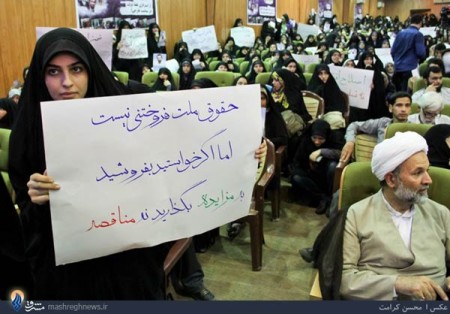For the first time, Iran’s growing hardline challenge to President Rouhani moved into the nuclear arena, with rallies and declarations throughout the week.
Launched on May 3, the “We Are Worried” campaign (pictured) rallied after Tehran Friday Prayers against Government “weakness” in the nuclear talks, which resume on Tuesday with the 5+1 Powers.
The movement includes the Endurance Front, the leading hardline opposition bloc; senior clerics; and former officials of the Ahmadinejad Government, such as top nuclear scientist Fereydoun Abbasi.
While avoiding a direct confrontation with the Government — because of the Supreme Leader’s continued support for talks — the Revolutionary Guards indirectly pressed the President with denunciations of US weakness and citations of the criticisms of other hardline outlets.
President Rouhani and his inner circle countered the pressure with a combination of pushback and assurances that they would defend Iran’s fundamental interests. Rouhani denounced “spoilers” who want to undermine the talks, as he and Iran’s top negotiators pointed to those who “profit from continued sanctions”.
The President and Foreign Minister Zarif said Iran would not accept “nuclear apartheid”, insisting on Iran’s right to uranium enrichment in a final settlement.
The campaign against the Government continued on the cultural front, with Tehran Friday Prayers leaders warning Ministers against a “return to the Reformist period” of President Khatami between 1997 and 2005.
And the Government’s room for manuever on the economic front faced the threat of being closed down. The Revolutionary Guards used their media outlets to warn the Oil Minister against his efforts to attract foreign investment to revive oil and gas fields.
However, the President is not the only leader facing pressure. The Supreme Leader also has his problems, as Ayatollahs called for the release of political prisoners — including key opposition figures Mir Hossein Mousavi, Mehdi Karroubi, and Zahra Rahnavard — and there was public talk questioning Ayatollah Khamenei’s continued hold on power.
FORECAST
The Rouhani Government has been increasingly confined for weeks to its economic initiatives and its “engagement” of the 5+1 Powers in nuclear talks, with hardliners blocking political and cultural initiatives.
This month’s events, however, pose an even greater challenge to the President. Hardliners cannot halt the nuclear talks, but they can push the Government into the adoption of a tougher line with the 5+1 Powers.
So Rouhani and his Ministers have to pull off a balancing act between now and July 20, when a comprehensive deal is supported to replace November’s interim nuclear agreement. If they set the tough line, it could rule out essential compromise with the 5+1 Powers on uranium enrichment facilities. However, if they appear to accept some of the US and European conditions, they could stoke hardline fury looking to sabotage any arrangement.
The position is not helped by the economic intersection with the talks. Rouhani needs signs of recovery to strengthen his position, but the US indicated again last week that it would not relax sanctions before further progress in the discussions — even Iran’s food supplies, which are not subject to sanctions, are being hindered.
FEATURED ANALYSES
Is the Supreme Leader in Trouble at Home?
“130,000 Iranian Fighters Ready to Enter Syria” — How Revolutionary Guards’ Revelation Was Censored
Is Zarif Withdrawing Comments About Holocaust as “Genocide” & “Heinous Crime”?
Revolutionary Guards Lash Out at Oil Minister over Foreign Investment
FEATURED 1ST-HAND
“Stealthy Freedom” –– Women Photograph Themselves Without Hijab

